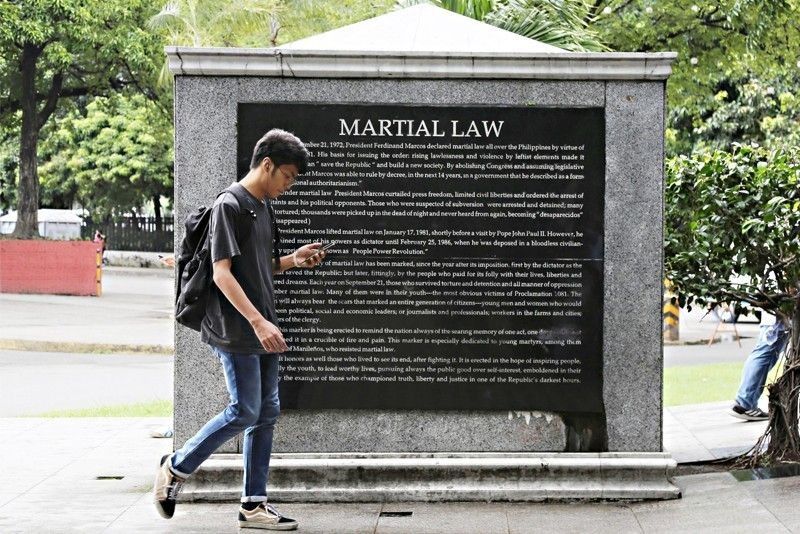On Marcos' birth anniversary, anti-torture advocates ask SC to nullify law 'reminiscent' of dictatorship

MANILA, Philippines — On the birth anniversary of ousted dictator Ferdinand Marcos Sr., torture survivors and families of involuntary disappearances asked the Supreme Court to nullify the Anti-Terrorism Act of 2020, a law that is “reminiscent” of the "dictatorship of Marcos," they said.
Led by the United Against Torture Coalition-Philippines, the petitioners argued that provisions of Republic Act 11479 or the ATA run contrary against the Constitution and the anti-torture law, “particularly those that value the dignity of every human person and guarantee full respect for human person and guarantee full respect for human rights of all persons, including suspects, detainees and prisoners.”
READ: 'More than money, it is about memory': Fight against dictatorship continues for some Marcos victims
Dr. Benito Molino, a forensic expert and petitioner in the case, stressed: “What makes torture abhorrent is not only what it does to the victims but how the system condones and hide it.”
“The ATA brings back memories of gross human rights violations of the Marcos regime,” he added.
Retired SC Justice Antonio Carpio earlier said that with the anti-terrorism law in our statute books, "it is as if the Philippines is permanently under a situation worse than martial law."
READ: Carpio warns: Situation 'worse than martial law' under anti-terrorism law
The ATA also runs contrary to the Republic Act 10353 or the Anti-Enforced Disappearances Act of 2012—the law that took decades after the martial law rule and thousands of enforced disappearances to be enacted.
The Families of Victims of Involuntary Disappearances (FIND) said they recorded nearly 2,000 documented cases of enforced disappearances during the martial law. “Most of the victims are still missing and their families left to heal by themselves from damages and economic displacement,” the statement read.
FIND Secretary General Joey Faustino said: “Torture and enforced disappearance are usually paired by unbridled authority... we need laws like this (RA 10353) to protect our rights, not to stifle them.”
Prolonged detention conducive to torture
The group assailed Section 29 of the law that allows the authorities to detain a suspected terrorist for 14 days before they are required to bring the person to judicial authority. The period of detention is extendible by another ten days.
In a statement, they said that this condition is “conducive to the person detained for being tortured or coerced into involuntary confession, forcibly made to disappear or even summarily executed, which the anti-torture law aims to prevent.”
They also noted that this period is far longer than what the Constitution allows when the privilege of the writ of habeas corpus is suspended. “Warrantless arrests of designated suspects and prolonged pre-trial detention heighten the risk as shown by years of documented cases,” lawyer Cristina Sevilla, counsel of the petitioners, said.
Coupled with the “dismal human rights record” and “misogynistic acts” of the administration of President Rodrigo Duterte, “the implementation of the ATA will have a chilling effect to every woman, especially the most vulnerable among us such as the prostituted woman who have experienced torture in the hands of authorities,” Jean Enrique of the Coalition Against Trafficking Women-Asia Pacific, and co-petitioner, said.
They also said that the law’s provision on designation of individuals or groups as terrorists by the Anti-Terrorism Council “will only institutionalize the government’s repressive and discriminatory measures.”
Even humanitarian workers and health care workers treating wounded persons who are suspected terrorists may be accused of providing “material support for terrorism,” Edeliza Hernandez of the Medical Action Group said.
This is the 33rd petition challenging the constitutionality of the anti-terrorism law. The case has been set for oral arguments, although date has yet to be determined.
President Rodrigo Duterte signed the Anti-Terrorism Law on July 3 despite opposition from rights groups and civil society groups that it could be used to stifle human rights.
A petition against the law has been filed at the Supreme Court and other groups are preparing pleadings of their own.
Follow this page for updates. Photo courtesy of The STAR/Michael Varcas
National Security Adviser Hermogenes Esperon moves to block access to several websites, including news sites of alternative news orrganizations Bulatlat.com and Pinoyweekly.org.
In his letter to the National Telecommunications Commission, he only says the websites are "affiliated to and are supporting these terrorists and terrorist organizations."
No other basis to back up his allegation was cited in the letter.
Citing the designation of the CPP-NPA-NDF as terrorists, NSA Hermogenes Esperon moves to block access to several sites.
— Kristine Patag (@kristinepatag) June 22, 2022
In Esperon's letter to the NTC, he included news sites @bulatlat and @pinoyweekly; sites of other progressive groups RMP and Save our Schools. @PhilstarNews pic.twitter.com/nAzMITJFsS
The Commission on Human Rights says it "partly welcomes" the Supreme Court decision that some parts of the controversial Anti-terrorism Law are unconstitutional.
CHR spokesperson Jacqueline de Guia says the commission remains hopeful that the remaining contentious provisions of the law will be clarified by the high cour in the full text of the decision.
"At the same time, our commitment remains in guarding against possible human rights violations arising from the implementation of the anti-terror law. We steadfastly remind the government that countering terrorism and protecting human rights are not competing values but are, in fact, mutual and complementary," De Guia says in a statement.
The Supreme Court has deliberated and voted on the controversial Anti-Terrorism Act but the decision will be released "at the soonest time possible."
"However, considering that there were numerous issues resolved in the case, as well as the fact that each Justice had to vote on each issue, there is a need to accurately confirm and tally the vote of each Justice in order to ensure the correct resolution of the Court per issue," SC spokesperson Brian Hosaka says.
The Anti-Terrorism Council designates the National Democratic Front of the Philippines, the panel that negotiates for communist rebels during peace talks a terrorist organization.
Previous designation of the Communist Party of the Philippines and New People's Army led to the designation of supposed members of the CPP's Central Committee. Among those designated as terorrists were peace consultants.
Designation gives the Anti-Terrorism Council the authority to investigate and freeze the accounts of designated persons.
The Anti-Terrorism Council has designated 29 people, including alleged members of the Communist Party of the Philippines-New People's Army, as terrorists in two resolutions.
Designation allows the Anti-Money Laundering Council to freeze the assets of those on the list.
- Latest
- Trending

































